|
|
|
Sort Order |
|
|
|
Items / Page
|
|
|
|
|
|
|
| Srl | Item |
| 1 |
ID:
046940
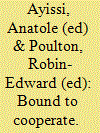

|
|
|
|
|
| Publication |
Geneva, UNIDIR, 2000.
|
| Description |
xv, 206p.
|
| Standard Number |
9290451378
|
|
|
|
|
|
|
|
|
|
|
|
Copies: C:1/I:0,R:0,Q:0
Circulation
| Accession# | Call# | Current Location | Status | Policy | Location |
| 044208 | 303.609664/AYI 044208 | Main | On Shelf | General | |
|
|
|
|
| 2 |
ID:
047101
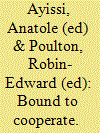

|
|
|
|
|
| Publication |
Geneva, United Nations Institute for Disarmament Research, 2000.
|
| Description |
xv, 206p.
|
| Standard Number |
9290451378
|
|
|
|
|
|
|
|
|
|
|
|
Copies: C:2/I:0,R:0,Q:0
Circulation
| Accession# | Call# | Current Location | Status | Policy | Location |
| 044300 | 303.609664/AYI 044300 | Main | On Shelf | General | |
| D44300 | 303.609664/AYI D44300 | Main | On Shelf | General | |
|
|
|
|
| 3 |
ID:
085126
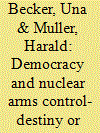

|
|
|
|
|
| Publication |
2008.
|
| Summary/Abstract |
Is there a particularly democratic way of dealing with nuclear arms control? Against the background of democratic peace (DP) theory, and using Immanuel Kant's writing as a starting point, this article argues that democracies should indeed develop a preference for arms control, but that Liberalism as well as the nature of nuclear weapons opens the possibility for contingent developments within a DP framework. While DP theory can thus account for the existence of variance, we maintain that a social constructivist complement based on role, identity, and enemy perception can best explain why a given democracy follows a specific path. Case studies of six Western democracies reveal a considerable variance in their nuclear arms control policies, which can indeed be traced back to the countries' respective roles, identities, and images of the Kantian "unjust enemy."
|
|
|
|
|
|
|
|
|
|
|
|
|
|
|
|
| 4 |
ID:
128069
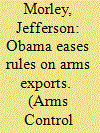

|
|
|
|
|
| Publication |
2013.
|
| Summary/Abstract |
In a little-noticed move Oct. 15, the U.S. government began to revamp its long-standing system for regulating the export of U.S.-made weapons ranging from submachine guns and night vision goggles to killer drones and fighter jets. The Export Control Reform Initiative, launched by the Obama administration in August 2009, will affect U.S. oversight of U.S. firms supplying the $83 billion global arms market. In an Oct. 15 statement, the White House said the initiative will end "the disproportionate focus on the least sensitive items such as nuts, bolts and screws instead of the most sensitive items"; encourage closer logistical collaboration with U.S. military allies and partners; and boost the U.S. defense industrial base.
|
|
|
|
|
|
|
|
|
|
|
|
|
|
|
|
| 5 |
ID:
115341
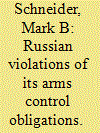

|
|
|
|
|
| Publication |
2012.
|
| Summary/Abstract |
The Soviet Union and its successor state the Russian Federation have consistently violated their arms control obligations since the beginning of modern arms control in 1972. The violations have involved all major nuclear arms control treaties, including those that limit strategic and theater nuclear arms and constrain nuclear testing. This pattern of behavior is certain to continue. As a result, the nuclear warheads on the Russian missiles apparently will have been tested in contravention of a declared nuclear test moratorium and Russia's legal obligations concerning the CTBT. There is almost never any consequence for these violations. These violations have clear military significance, and they should have an impact upon our views of arms control. Regrettably, they do not. The evidence is more often suppressed than provided to the American people and we continue to ignore it in our arms control policy.
|
|
|
|
|
|
|
|
|
|
|
|
|
|
|
|
|
|
|
|
|